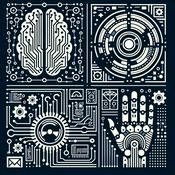This is you Emerging Technology Trends: AI, Robotics & Digital Innovation podcast.
As we step into late February 2026, the fusion of artificial intelligence, robotics, and digital innovation is accelerating like never before, reshaping industries from manufacturing to healthcare. Agentic artificial intelligence, capable of reasoning, planning, and executing tasks autonomously, is evolving from assistants to digital coworkers, as Microsoft's experts predict, compressing innovation cycles from months to days. The Innovation Mode blog highlights how these AI agents, combined with humanoid robots now scaling from labs to factory floors, are driving breakthroughs, with Hyundai's Atlas robot debuting for production at CES earlier this year.
Market data underscores the boom: Fortune Business Insights reports the global artificial intelligence robots market hit seven point four six billion dollars this year, projected to surge to sixty point six eight billion by 2034 at a thirty percent compound annual growth rate, led by manufacturing's forty point four eight percent share. North America dominates with two point seven eight billion dollars, while Asia Pacific grows fastest at twenty-nine point five zero percent, fueled by China's smart factories. Deloitte's survey reveals nearly three in four companies plan agentic artificial intelligence deployment within two years, integrating with Internet of Things sensors for predictive maintenance.
Quantum computing and blockchain enhance this ecosystem, enabling secure, ultra-fast data processing for robotics, though integration challenges like dexterity and ethical data use persist. Regulators push for safety standards amid investments pouring into physical artificial intelligence, per Manufacturing Dive. Cross-industry trends show Amazon's millionth robot boosting warehouse efficiency by ten percent, and BMW's self-driving factory cars.
Looking ahead, these technologies predict massive disruption: AI partnering in scientific discovery, humanoid robots in homes and logistics, and ethical frameworks curbing biases. Listeners, practical takeaways include upskilling in agentic tools, piloting Internet of Things for supply chains, and auditing ethics in deployments to seize opportunities.
Thank you for tuning in. Come back next week for more. This has been a Quiet Please production, and for me, check out Quiet Please Dot A I.
For more http://www.quietplease.ai
Get the best deals https://amzn.to/3ODvOta
This content was created in partnership and with the help of Artificial Intelligence AI



